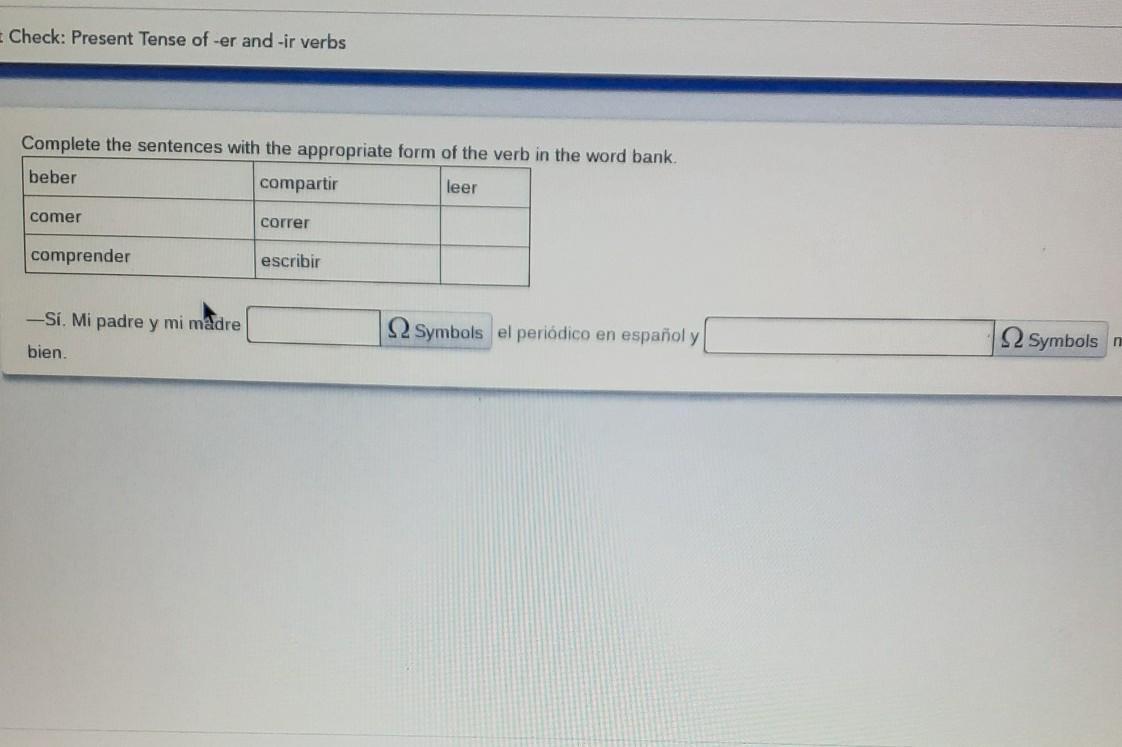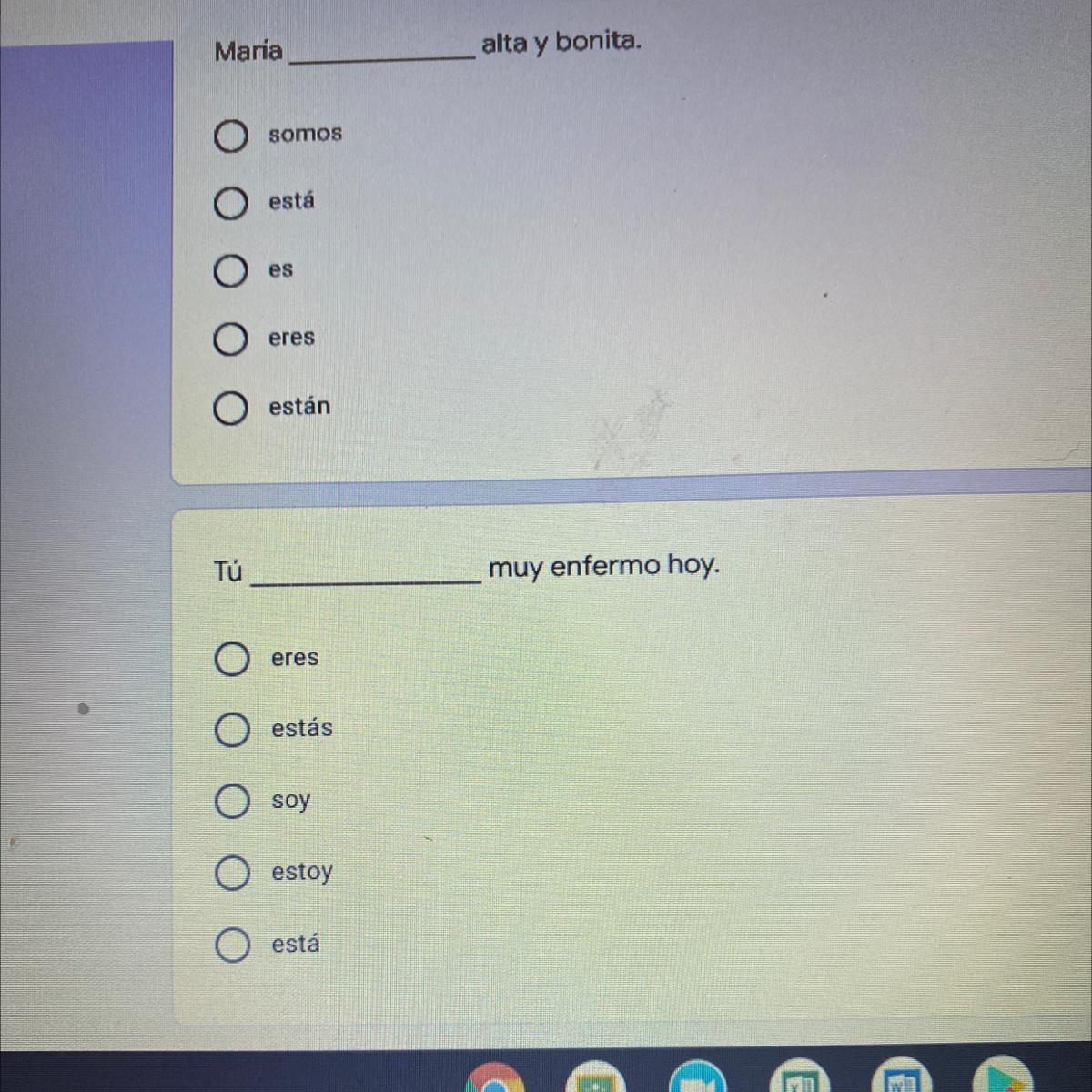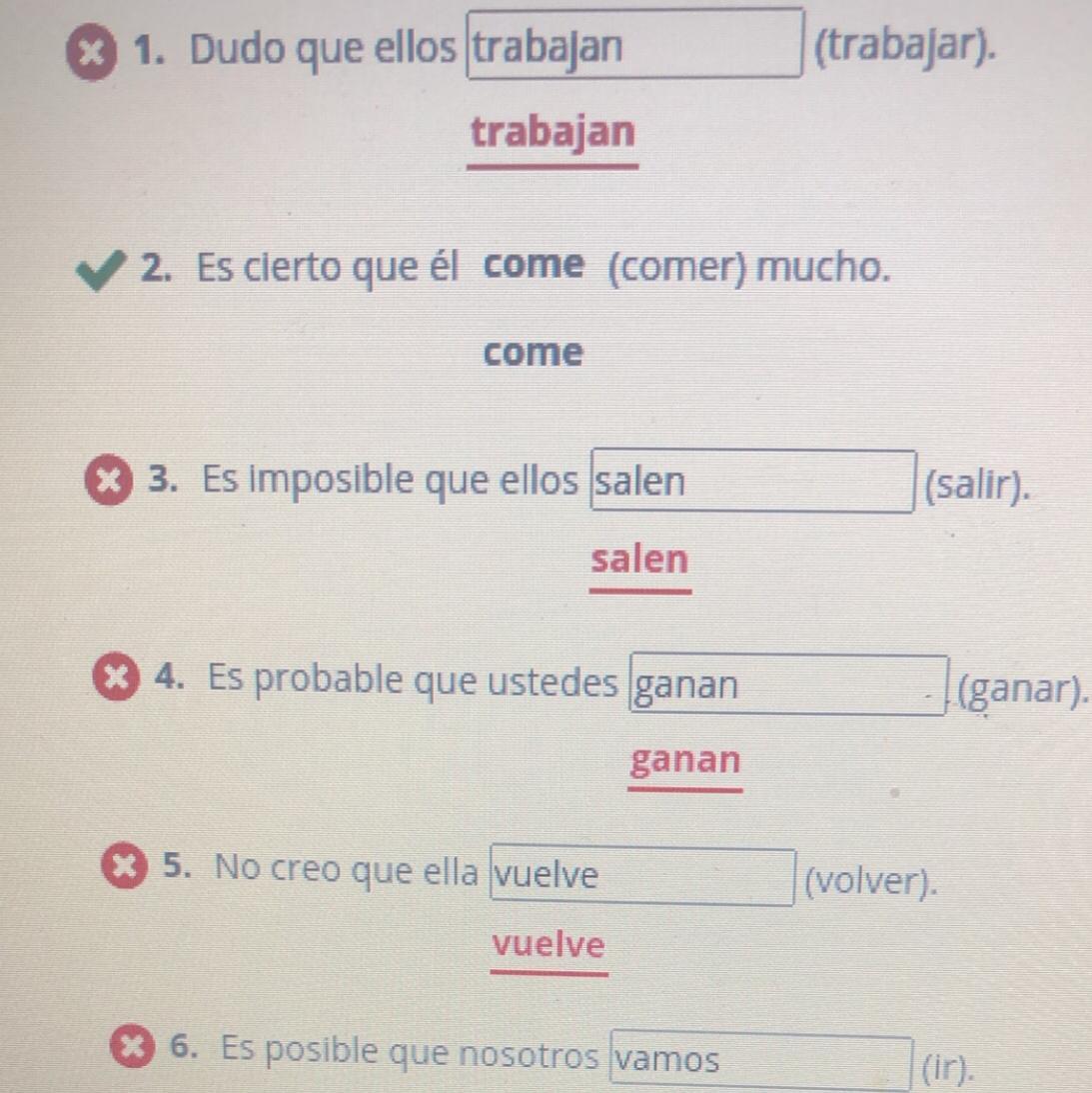please help me with this, which word from the top will it be? and if it has an er, or ir verb ending.

Answers
Answer: they are called infinitves
Explanation:
Related Questions
Ensayo sobre ventajas y desventajas de los teléfonos inteligentes
Answers
Facilita la comunicación.
Hace la vida más facil al poder estar actualizado con las noticias, encontrar direcciones gracias al GPA.
Facilita los estudios, puedes escuchar música y leer en tu teléfono.
Puedes comprar y hacer lo que sea si lo usas bien.
Desventajas:
Distrae mucho. Muy obsesivo/adición.
Te quedas ciego.
Pierdes tiempo.
Problemas de seguridad. Nunca nadie tiene nada 100% seguro. Te pueden hackear.
No duermes pon andar en el celular.
Accidentes por andar en el celular.
Crea brechas entre las generaciones.
HELP ASAP!! What does is happening in this image? In both english and spanish please.

Answers
Answer:
english: gardening spanish:jardinería
Explanation:
What is the opposite of arriba? abajo lejos hasta allí
Answers
Answer:
abajo
Explanation:
Necesito 10 oraciones de predicado verbal
Answers
The ten examples of verbal predicate sentences are: Mis padres salieron a comer pizza, el concierto duró hasta la media noche, las paredes fueron pintadas por el pintor, mii madre preparó unas hamburguesas deliciosas, la película duró hasta la madrugada, la ventana quedó cerrada toda la mañana, los niños tienen una clase, el televisor funciona mal, los estudiantes irán al estadio de la ciudad, nosotros iremos al cine, la ropa sigue manchada.
How to make verbal predicate sentences?Verbal predicate sentences are a term that refers to a type of sentences that are characterized because the predicate includes an action (verb) that affects the subject. For example: Luis ran to the park. According to this definition, some examples of verbal predicate sentences would be:
Mis padres salieron a comer pizza.
Learn more about verbal predicate in: https://brainly.com/question/9372103
#SPJ1
Answer the following w

Answers
Answer:
María _es_ alta y bonita
Tú _estás_ muy enfermo hoy
Explanation:
50 points!
Rewrite the sentences in the imperfect tense.
Yo sé hacerlo.
Ellos pueden ir.
¿Qué va a decir?
Answers
¿A qué hora?
Indicate at what time these events take place.
Modelo: la clase de matemáticas (2:30 p.m.)
La clase de matemáticas es a las dos y media de la tarde.
1. el programa Las cuatro amigas (11:30 a.m.)
Question 2
el drama La casa de Bernarda Alba (7:00 p.m.)
Question 3
el programa Las computadoras (8:30 a.m.)
Question 4
la clase de español (10:30 a.m.)
Question 5
la clase de biología (9:40 a.m.)
Question 6
la clase de historia (10:50 a.m.)
Question 7
el partido (game) de béisbol (5:15 p.m.)
Question 8
el partido de tenis (12:45 p.m.)
Question 9
el partido de baloncesto (basketball) (7:45 p.m.)
Answers
2- el drama La casa de Bernarda Alba es a las siete en punto de la tarde
3- el programa Las Computadoras es a las ocho y media de la mañana
4- la clase de español es a las diez y media de la mañana
5- la clase de biología es a las nueve y cuarenta de las mañana
6- la clase de historia es a las diez y cincuenta de la mañana
7- el partido de béisbol es a las cinco y quince de la tarde
8- el partido de tenis es alas doce y cuarenta y cinco de la tarde
9- el partido de baloncesto es a las siete y cuarenta y cinco de la tarde
A good scholar know that it is up to him or her to succeed. In order to suceed, you must give your best effort to all learning activities. Explain How you will develop this habit of a scholar
Answers
PLEASE HELP ASAP! NO TRANSLATORS PPLEASE

Answers
Explanation:
i hoped this helped
Now that you have worked through a lot of material that includes these basic patterns, and you have compared grammatically correct and incorrect sentences, write down what you think is a rule that could explain what makes a sentence grammatically correct or not. For example, you might write something like: "verbs always match nouns in number, and they usually Come before the noun." In other words, make your best guess for the grammar rule that makes sense out of the pattern(S) you see in the phrases you have been working with. Review if you need to, and you might briefly check your hunches against the sentences you have been working with in this or previous modules. Keep in mind that what you're after is your hunch, not a grammar rule from a text book. Now check your hunch with the explanation of this principle in the following pattern.
Answers
A general rule about the verb would be:
The verb coincides in number and person with the subject of the sentence.
\( \boxed{ \bold{Explanation}}\)
The verb coincides in number and person with the subject of the sentence. For example:
Yo vienen a comer.It is written correctly, we come from the third person plural pronoun (they) when it is the first person singular (I).
Correctly written it would be:Yo vengo a comer. MissSpanishASAP ARE THESE RIGHT??

Answers
Answer:
on the second text its .tengo. not tenga
Answer:
1. is right
2. is right
3. tengo
4. is right
5. is right
Explanation:
Hope this helped! :)
Select the plural Uds. formal affirmative command for the verb abrir.
Abra
Abran
Abres
Abren
Answers
Answer:
Si, abran la pueta.
Explanation:
Answer:
Abran
Explanation:
put in you form, drop the o, add an
Answer the following questions in Spanish using complete sentences
15. ¿Cuándo fue Ana a México?
16. ¿Quién quiso venir a México, pero no pudo?
17. ¿En qué lengua habló Ana?
18. ¿Hay selva en Puerta Vallarta?
19. ¿Jugó Ana a deportes?
20. ¿A Ana le gustaron las vacaciones en México?
Answers
15. Ana fue a México hace dos años.
16. Juan quiso venir a México, pero no pudo por motivos de trabajo.
17. Ana habló en español con los locales y con los turistas que conoció.
18. Sí hay selva en Puerta Vallarta.
19. Sí, Ana jugó a muchos deportes acuáticos como el kayak y el buceo.
20. Sí, le gustaron mucho las vacaciones en México.
Completa el espacio en blanco con la mejor respuesta.
A mí me __________ la pierna.
Answers
It translates into my leg hurts :)
Answer:
C
Explanation:
Use the five terms below to write in Spanish about something a student might do during the school day.
la grapadora
las tijeras
el proyecto
los materiales
el informe
Answers
Definitions for the terms:
La grapadora: the staplerLas tijeras: the scissorsEl proyecto: the projectLos materiales: the materialsEl informe: the reportParagraph using the terms:
Hoy, el estudiante va a trabajar en el proyecto que le asignó la maestra. Tiene que escribir un informe en su animal favorito. Entonces, el estudiante decidio escribir el informe en caballos. Para puntos extra, la maestra dijo que también pueden hacer un dibujo de su animal. El estudiante entonces consiguió todos los materiales que necesitaba: las tijeras, la grapadora, y plumas de color.
Translation:
Today, the student is going to work on the project his teacher assigned him. He has to write a report on his favorite animal. So, the student decided to write the report on horses. For extra points, the teacher said that they can also make a drawing of their animal. The student then got all the materials he needed: the scissors, the stapler, and color pencils.
Which phrase best completes the sentence? _______________ hagas una lista con todos los gastos del mes. A. En caso que b. Es necesario que c. Estoy seguro que d. No hay duda que.
Answers
Answer:
Es necesario que hagas una lista con todos los gastos del mes
Oración denotativo con la palabra leon
Answers
Un león es un felino grande y carnívoro que habita en las regiones de África y algunas partes de Asia.
4. Para participar, hay que correr
Answers
3. What do -ar, -ir, and -er infinitive verbs have in common in the future tense?

Answers
I am in year 8 and I need to do this in spanish,
My info that will help in the spanish thing: my name is NIklas and I was bornd in sweden mom from ukraine and dad from russia. I am 14 and I have a borther that is 15, I live in stokholm.
Quesion: Using the knowledge and vocabularies learnt, prepare a write-up to talk about youself in Spanish.
Remember to include the following
Name, age, nationality, country you live in, family, birth date, likes and dislikes and interests
Answers
Answer:
mi nombre es NIklas y nací en Suecia, mamá de Ucrania y papá de Rusia. Tengo 14 años y una borther de 15 años, vivo en Stokholm.
Explanation:
there you go
Answer:
Name, NIklas (date of the text)
age, 14 años (date of the text)
nationality, Sueco (date of the text)
country you live in, Estocolmo (date of the text)
family, Su mamá es de Ucrania, y su papá es de Rusia y un hermano que tiene 15 años. (date of the text)
birth date, 15 de junio de 2007 (date for myself, not include on text)
likes and dislikes and interests, Me gusta jugar futbol soccer, no me gusta comer pizza y pretendo estudiar en la Universidad Nacional (date for myself, not include on text)
Señor, ¿Ud. ____________________ el alemán? (hablar)
Answers
Answer:
Habla.
Explanation:
Habla...
Habla
Have a great day!
1. Cual de las siguientes estructuras tiene el titulo *Los fantasmas tienen buena letra* ?
opciones.
a_ ST y PVS
b_ SES y PVS
c_SES y PVC
??? doy corona a la priera respuesta correcta xfis
Answers
Fill in the blanks with the appropriate possessive adjectives.

Answers
Tú
Nuestro
Su
Tú
Tú
Su
Nuestro
Sus
Sus
Nuestros
Mis
Mis
Sus
mis amigos / descansar en la playa example answermis amigos están descansando en la playa.
Answers
Answer in bold and underlined.
Answer: Mis amigos están descansando en la playa.
Translation: My friends are resting on the beach.
Answer: In bold and underlined
Mis amigos Están descansando en la playa.
Translation: My friends are resting on the beach.
Read and choose the correct option with the irregular verb in the imperfect tense.
El anillo fue caro pero bellísimo.
En 2017, tú veías a tu madrina todas las mañanas.
Las familias compraban las fotos de la boda después de la fiesta.
Ruth va a la boda de su ahijada el domingo por la tarde.
Answers
Answer:
Is A or C .
But I think that is A.
Explanation:
Answer:
c
Explanation:
there are more details the family bought photos for the wedding
a is wrong because its not a complete sentence
For the last year Juanita has been living in New York. She has made a list of last minute purchases that she needs to make before returning home to Spain.
Which of the following stores will Juanita NOT need to visit in order to purchase any of the items on this list?
Answers
???
Answer:
grocery store
Explanation:
Escucha lo que cuenta isabel sobre la cena e indica si los verbos de la lista se usan en el pretérito o el imperfecto.
Answers
Los verbos tuvimos, ordenamos, limpie, hacía , enfadé, puso, hizo, terminamos, acabamos, comenzó y fue se usan en el pretérito, mientras que el verbo miraba se utiliza en el imperfecto.
¿Cómo identificar la diferencia entre el pretérito y el imperfecto?Por una parte, el pretérito se refiere al tiempo pasado. Es decir que los verbos en este tiempo demuestran acciones cortas que ya terminaron. Algunos ejemplos son: limpie, ordenamos, puso, terminamos, entre otros.Por otra parte, el imperfecto se utiliza para acciones que son hábitos en pasado, un ejemplo de esto es el verbo miraba en contraste con el verbo miró.Nota: Aquí esta la información faltante:
Estoy agotada porque ayer mi novio y yo Tuvimos una cena y en menos de dos horas ordenamos toda su casa yo limpie el baño y Ricardo la cocina pero luego mientras yo hacía la cena me di cuenta de que Ricardo miraba la televisión no se imaginan como me enfadé y luego él puso la mesa pero no hizo nada más pueden creerlo afortunadamente terminamos de ordenar la casa antes de que llegara el señor Álvarez cuando acabamos de cenar comenzó a llover mucho así que les tuve que prestar un paraguas a los invitados y bueno Ricardo se fue a la cama a las 11 porque tuvo que lavar los platos fue una cena divertida la verdad es que mi novio Ricardo es un chico con mucha suerte.
Aprenda más sobre el pretérito en https://brainly.com/question/31452601
#SPJ1
Help me please ?!!!!!!

Answers
Answer:
1. "Dudo que ellos trabajen."
3. "Es imposible que ellos salgan."
4. " Es probable que ustedes ganen."
5. "No creo que ella vuelva."
6. "Es posible que nosotros iremos."
BONUS: Creo que ellos juegan al futbolNo niego que ustedes estudianEs posible que ella no venga a casaEs probable que Lucio y Carmen duermanEs posible que mi prima Marta llametal vez Juan nos oiga:) hope this helps
Answer:
Dudo que ellos trabajen
Es imposible que ellos salgan
Es probable que ustedes ganen
No creo que ella vuelva
No es posible que nosotros fueramos
Explanation:
Please help me with my Spanish work

Answers
Answer:
Explanation:
¡No sabes lo grande que es!¡No sabes lo cómicas que son!¡No sabes lo sucio que está!¡No sabes lo brillantes que están!¡No sabes lo pequeños que son!¡No sabes lo simpático que es!¡No sabes lo feroz que es!A nosotros _____________ el terreno. (interesar)
A. interesamos
B. nos interesamos
C. interesa
D. nos interesa
Answers
Answer:
D "nos interesa" a nosotros nos interesa el terreno